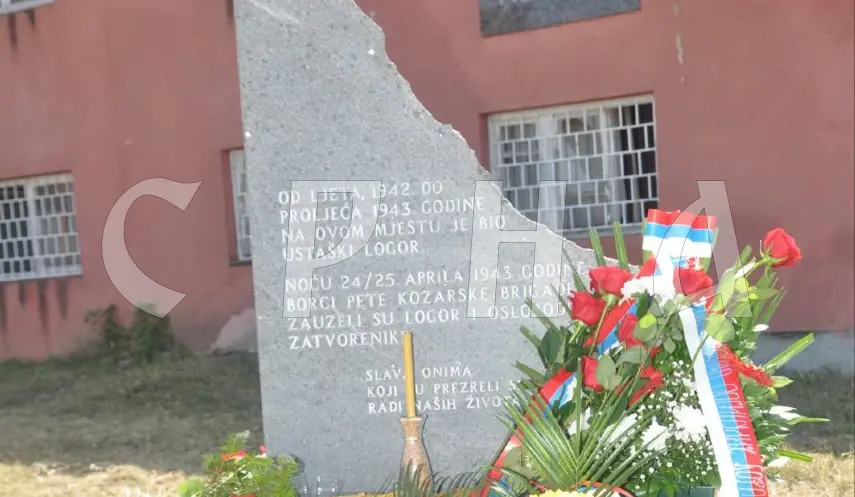MEMORIAL SERVICE FOR SERBS WHO DIED AT THE CIGLANA CAMP
Republika Srpska - Prijedor - remembrance
07/25/2025
14:23

PRIJEDOR, JULY 25 /SRNA/ – At the memorial site of the former Ustashe concentration camp Ciglana, through which around 14,000 residents of Potkozarje passed, a memorial service was held today and wreaths were laid for the Serbs who were killed there during World War II.
The camp, which operated from July 1942, during the German and Ustasha offensive on Kozara, until the end of April 1943, was a place where the residents of Potkozarje were tortured and brutally killed or died of hunger and typhus, while many were transferred to the infamous Jasenovac camp.
Radenko Topalović, Head of Cabinet of the Minister of Labor and Veteran and Disability Protection of Republika Srpska, stated that Ciglana camp is a symbol of the suffering of innocent people in World War II, and that it is an obligation and duty to preserve memories and historical facts from oblivion.
"It is our obligation and duty to visit such places, to nurture culture of remembrance for the innocent victims, and to persevere in truth, which nowadays is increasingly being rewritten and changed in favor of those who did not contribute nearly as much as the Serbian people did in the fight against fascism," Topalović stressed.
Nenad Mejakić, Deputy Mayor of Prijedor, said that preserving memory should serve peace and the prevention of repeating historical mistakes.
Slaviša Knjeginić, Vice President of the City Organization of Families of Captured and Fallen Soldiers and Missing Civilians, stated that everyone who had ancestors at this place should be present at such commemorations.
Among the prisoners was Mladen Vučkovac, now a retired professor, who spent time in the camp as a one-month-old baby in the summer of 1942. He later learned about those days from his mother, with whom he and his four siblings were imprisoned.
"In this camp, it was hellish, and many inmates did not survive. It was a large Ustasha-Domobran collection camp gathering people from the entire Prijedor district. When we arrived, they placed us in drying sheds where bricks were dried. They took away the men. In two nights, 20 men from my hamlet were taken away and never returned," Vučkovac said.
He has also published a book on the topic titled "Prijedor's Ciglana Camp 1942 – Lest We Forget".
The monument within the grounds of the for

SERBS IN TEARS AND FEAR OVER OWNERSHIP OF ORTHODOX CEMETERIES AND CHURCHES

CVIJANOVIĆ DEMANDS ACCOUNTABILITY FOR SHAMEFUL CONCERT IN ŠIROKI BRIJEG

OSTOJIĆ URGES BiH AND EU TO ACT OVER GLORIFICATION OF FASCIST IDEOLOGIES





